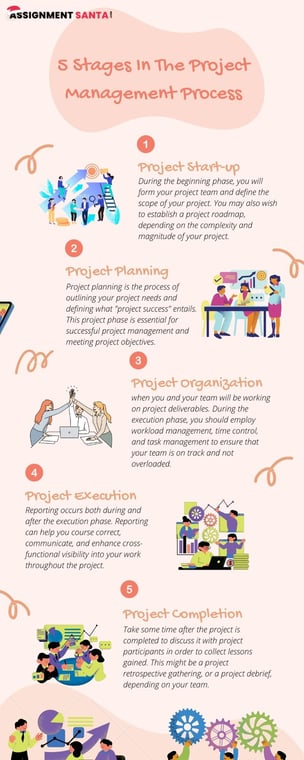Top-notch Project Management Assignment Writing Service for Students

One of the most challenging degrees is project management, which calls for a variety of skills, knowledge, and information in addition to essential competence.
Despite the field's intricacy, massive paper, assignment writing chores, presentations, and so on, students all around the world are welcoming it. Being a recognized stream necessitates the most work and patience, while also offering a number of challenges for students to overcome and be rewarded for in terms of acquiring practical knowledge and getting excellent grades. Students usually have considerable obstacles while writing project management assignments; hence, our 'Project Management Assignment Writing Service' offers students all forms of assignment assistance. Management degrees are popular due to their numerous benefits, which we will discuss below.
Major Benefits of Project Management
- Have a more reliable project planning and execution procedure with the support of project managers.
- Follow project budgets, deadlines, and scope restrictions.
- More quickly and easily resolve project barriers and escalate concerns.
- Identify and cancel initiatives with no business value.
- Increase your efficiency.
- Improve team and cross-team collaboration.
- Recognize and prepare for dangers.
Now consider the duties and responsibilities of project managers.
What Are Project Managers Responsible For?
In brief, project managers are in charge of project planning, execution, monitoring, control, and completion, thus they must have a thorough grasp of the subject. However, it is only the tip of the iceberg when it comes to project management fundamentals. Here are some of the primary duties:
- Create the Plan: Project managers are in charge of charting the best feasible path for the project. The project scope, timeframe, and budget must all be included in the plan. This might also entail determining the appropriate tools for the work.
- Assemble the Team: Choosing the right team is crucial. Depending on the scale of the effort and the functions required to accomplish the project, each project team will be unique. It is excellent to get professionals and subject matter experts for each of the required duties.
- Assign Tasks: Project managers must offer a clear specification of specific tasks and timeframes for each phase of the project to their teams. Despite the fact that each team member will be accountable for their own assignments, many activities will necessitate teamwork from both internal and outside team members.
Every project will be different based on what you're working on, what team you're on, and how your team members cooperate. However, there are five major project stages that take place throughout the project management process in general:

- Project Start-up: During the beginning phase, you will form your project team and define the scope of your project. You may also wish to establish a project roadmap, depending on the complexity and magnitude of your project.
- Project Organization: Project planning is the process of outlining your project needs and defining what "project success" entails. This project phase is essential for successful project management and meeting project objectives. You will establish your project plan, define critical milestones, and agree on project expenses during the planning step.
- Project Execution: The executing phase will take up the majority of your project's time—this is when you and your team will be working on project deliverables. During the execution phase, you should employ workload management, time control, and task management to ensure that your team is on track and not overloaded.
- Project Reporting: Reporting occurs both during and after the execution phase. Reporting can help you course correct, communicate, and enhance cross-functional visibility into your work throughout the project. When your project is over, you may report on how it went and explore solutions with the project's participants on how to improve in the future.
- Project Completion: Take some time after the project is completed to discuss it with project participants in order to collect lessons gained. This might be a project retrospective gathering, or a project debrief, depending on your team.
Conclusion
In the competitive and dynamic business environment, project management is an essential skill, and students who master this discipline are well-equipped to excel in their careers. As they progress through their management programs, project management assignments and related services can be instrumental in developing their expertise and knowledge in this vital field.


